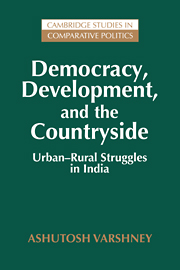Book contents
- Frontmatter
- Contents
- Preface
- A note on primary sources
- Introduction
- 1 Town–country struggles in development: A brief overview of existing theories
- 2 Nehru's agricultural policy: A reconstruction (1947–1964)
- 3 Policy change in the mid-1960s
- 4 The rise of agrarian power in the 1970s
- 5 Organizing the countryside in the 1980s
- 6 Has rural India lost out?
- 7 The paradoxes of power and the intricacies of economic policy
- 8 Democracy and the countryside
- Appendix: Liberal trade regimes, border prices, and Indian agriculture
- Index
- Titles in the series
8 - Democracy and the countryside
Published online by Cambridge University Press: 02 December 2009
- Frontmatter
- Contents
- Preface
- A note on primary sources
- Introduction
- 1 Town–country struggles in development: A brief overview of existing theories
- 2 Nehru's agricultural policy: A reconstruction (1947–1964)
- 3 Policy change in the mid-1960s
- 4 The rise of agrarian power in the 1970s
- 5 Organizing the countryside in the 1980s
- 6 Has rural India lost out?
- 7 The paradoxes of power and the intricacies of economic policy
- 8 Democracy and the countryside
- Appendix: Liberal trade regimes, border prices, and Indian agriculture
- Index
- Titles in the series
Summary
I have argued so far that India's rural sector has acquired substantial power since independence. I also contend that serious constraints limit the further evolution of rural power. Of the two claims, the first is more surprising for a developing country. Typically, the early stages of industrial development are characterized by a powerless rural sector. It is only after industrialization has reduced the countryside to a small proportion of the total population that an empowerment of the rural sector takes place, as is true of the developed countries today. Since a powerful countryside in a developing economy is rare, it calls for an explanation.
Rural empowerment in India has two aspects. Rural representation and voice in the politics above (parliamentary politics, state institutions) has significantly increased and, simultaneously, the politics below (mass political mobilization) is also marked by increasing rural organization. A democratic political system is related to both.
HOW DEMOCRACY MAKES A DIFFERENCE
The changing configuration of political elites
Universal franchise came to the West long after the industrial revolution. Independent India, on the other hand, was born in poverty with universal franchise. In a poor and largely agrarian country, the first politicians were predominantly urban. A substantial number of them were trained in law, the profession that led the national movement. The nation's democratic leadership, however, made a conscious decision to involve the countryside in mainstream politics.
Information
- Type
- Chapter
- Information
- Democracy, Development, and the CountrysideUrban-Rural Struggles in India, pp. 191 - 202Publisher: Cambridge University PressPrint publication year: 1995
Accessibility standard: Unknown
Why this information is here
This section outlines the accessibility features of this content - including support for screen readers, full keyboard navigation and high-contrast display options. This may not be relevant for you.Accessibility Information
- 1
- Cited by
